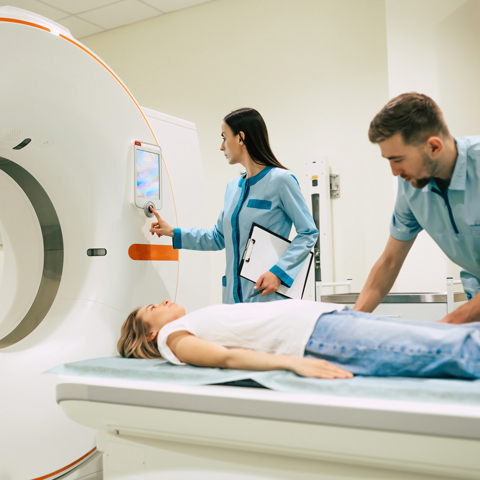Why study Nuclear Medicine
This is a small program and enrollment is limited. To be eligible for the certificate program, students must have a grade-point average (GPA) of 3.0 (on a 4.0 scale). Students are required to apply to the program and participate in personal interviews and observations at VUMC. Additionally, students must meet all requirements for the BSRS, General Radiologic Science Degree.
The nuclear medicine concentration is offered through a partnership with Vanderbilt University. Students complete the first three years study at APSU and, upon acceptance to the NMT program, complete the fourth year of their Bachelor of Science in Radiologic Technology through Vanderbilt University Medical Center. Graduates of the program receive a certificate from the Division of Allied Health at Vanderbilt University Medical Center and are eligible to take the national certification exam. Additionally, students must complete all requirements for the BSRS General Radiologic Science at APSU.
There are shortages of both clinical and research personnel in all nuclear medicine disciplines (chemists, radiopharmacists, physicists, engineers, clinician-scientists, and technologists) with an impending “generation gap” of leadership in the field
In cooperation with Vanderbilt University, Austin Peay State University offers a 12-month training program in clinical nuclear medicine technology. Students complete the first three years study at APSU and, upon acceptance to the program, complete the fourth year of their Bachelor of Science in Radiologic Technology through Vanderbilt University Medical Center (VUMC). Graduates of the program receive a certificate from the Division of Allied Health at Vanderbilt University Medical Center and are eligible to take the national certification exam.
Jenny Pafford, EdD, MS, CNMT, is the NMT program director. She is a certified nuclear medicine technologist and NMT program director. She oversees the clinical and didactic education of the NMT students. Since the students’ clinical experiences will be in more than one site, Dr. Pafford assures all clinical preceptors are experienced, certified and provide appropriate clinical instruction and supervision.
What Will I Learn
- Medical Imaging Physics
- Nuclear medicine technology
- Radiation safety
- Radiation surveys
- Radiopharmacy
- Patient care
- Patient imaging studies
- Quality control
Program Information
Nuclear Medicine Program Requirements
Nuclear Medicine Sample 4 Year Plan
Professional Licensure Disclosure
Students should be aware that licensure and certification requirements vary from state to state and are subject to change. Licensing agencies or boards also may have requirements in addition to an earned degree. APSU recommends that students who are not Tennessee residents or who plan to seek licensure or certification outside the state of Tennessee contact the appropriate licensing agency or board before they enroll in an academic program designed to lead to licensure or certification and discuss their plans with an advisor.
Please visit the Professional Licensure Disclosure webpage to review specific licensure information for your state and academic program.
